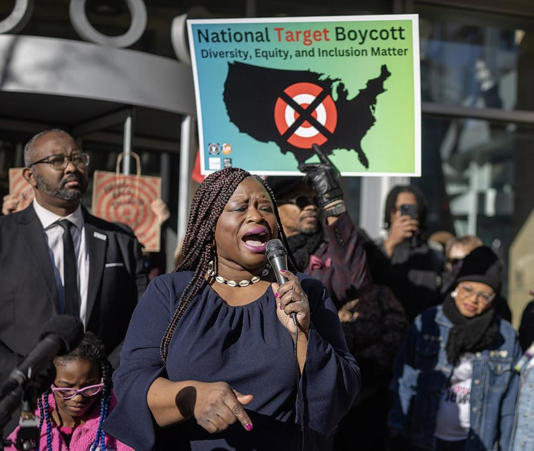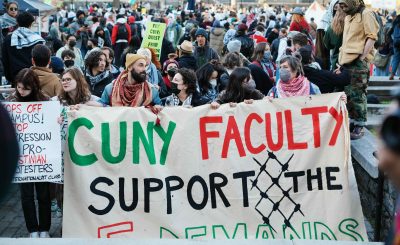
By: Katherine Soto. In the wake of President Trump’s recent executive order, on January 21, eliminating Diversity, Equity, and Inclusion programs (known as D.E.I.) from federal agencies, colleges across the country have found themselves in uncertain territory. At Queensborough Community College (QCC), the effects of this national shift are beginning to take shape, raising questions about what true diversity and inclusion will look like on campus moving forward.
The president’s order stated that D.E.I. initiatives “undermine merit and unity in the workplace,” and ordered that they be removed immediately from all federal agencies. It’s part of a broader campaign that the Trump administration claims is restoring “equal treatment,” but which others are describing as a direct attack on historically marginalized groups.
“I feel like this was a direct attack on everyone that falls under D.E.I.,” says Rafael Rodriguez, a student at QCC. “It frustrates me because they don’t realize how important it is for people of color or with disabilities to get the same opportunities as others/ white counterparts. D.E.I. does not help give jobs to people because they’re a certain race, it just helps to give them the same equal opportunity as everyone else while being just as qualified as the rest.”
The ruling has been greeted with approval by some on the right. The Heritage Foundation, an organization that supports the reversal, argues that D.E.I. “promotes resentment, not unity.”
Civil rights groups, however, argue that the executive orders are part of a disturbing trend of rolling back decades of progress. These actions “send a message that equity is no longer a priority,” the Leadership Conference on Civil and Human Rights stated.
While QCC has not changed any of its current D.E.I. programs, the national climate has caused students and faculty to feel perplexed and concerned. Kerri-Ann Smith, an associate professor of English and former Faculty Fellow for Diversity, Equity, and Inclusion, said, “I think that [confused] is the right word for it. There’s a lot of talk going around and students definitely have a reason and right to be worried. Everything changes and we can only take it day by day.”
In a recent news report, The New York Times described Trump’s executive orders as removing a “longstanding directive from the civil rights era that explicitly prohibited federal contractors from allowing segregated facilities where the elimination of support services in the interest of equality.” This has effectively made it so that government can legally allow segregation in government facilities.
As federal policy continues to evolve, students and educators are watching closely—and speaking out.
In a survey sent out to QCC students, 64% of the sample size answered yes to having benefited from a D.E.I. initiative. Eighty-two % openly said they were concerned and upset with the changes.
“Pretending everyone starts on equal ground just helps those already ahead,” said Jing Lin, a student at QCC. “If we care about fairness, we shouldn’t gut the tools that actually fight inequality.”
There is also ambiguity around this shift in policy. Lacking clear federal directive, institutions do not know how sweeping the executive orders really are. Some have already preemptively softened D.E.I. related language from job postings, anticipating possible legal blowback.
There have been companies that have very quickly rolled back their D.E.I. policies, leaving customers surprised and, in some cases, outraged.
Companies such as Ford, Walmart, McDonald’s, Apple, Google, PepsiCo, Disney and Target have all rolled back on their D.E.I. policies, some as early as the day after the abolishment of D.E.I. at the federal level was signed into action at the White House.
The idea behind these companies following along with our current administration and removing references to certain D.E.I. policies they had in place was to avoid unwanted conservative activism against “wokeness”. Political and social pressures led many companies and organizations either to rename or get rid of altogether D.E.I. policies and initiatives that promote and support minoritized communities.
Target especially has been hit with endless amounts of backlash and hate online through social media since they cut D.E.I. entirely. They were among the first companies to follow this administration’s new policies on “fairness”, and ended their goals and programs that mainly focused on racial equity and Black-owned businesses, according to an article from AP News.
Target is notoriously known for being popular among the African American community, with people claiming that black people spend upwards of $12 million a day at the retail store.
With this information spreading over the internet, influencers and people alike have openly called for the public to boycott Target until further notice. “We’re asking people to divest from Target because they have turned their back on our community,” Rev. Jamal Bryant, a prominent Atlanta-area megachurch pastor who started the boycott, said in an interview with CNN.
Since this boycott began, Target has lost more than $12.4 billion in revenue, seen its stock plunge by $27.27 per share, and is grappling with multiple lawsuits linked to its shifting D.E.I. policies.
Regardless of the speculation and worry amongst college students around the nation, New York has reportedly rejected many of President Trump’s efforts for change. There have been no efforts to roll back on any D.E.I. initiatives within the CUNY system, including QCC.
With this new administration, however, change is frequent, and as stated before, students should keep their eyes and ears open, prepare for anything, and take things day by day.



